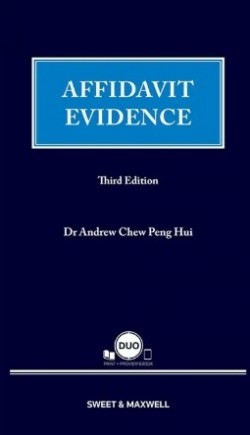
GET UP TO 15% DISCOUNT!
Sign up now as a CBS member & enjoy our royal discounts!

Affidavit Evidence - 3rd Edition
- Author : Dr. Andrew Chew Peng Hui
- Country : Malaysia
- Publication Date : Nov - 2025
- ISBN : 9786297700960
- Format : Hardcover + eBook
Affidavits play a major role in dispensing justice and many proceedings, particularly those of an interlocutory nature, aredisposed of on affidavit evidence alone. In cases where evidence can be conveniently and completely presented in affidavit form, its use will promote the efficient and more orderly disposal of cases. This important part of litigation practice is given a clear and comprehensive exposition by the book Affidavit Evidence.
This book presents a core subject of civil practice from the local perspective. The detailed discussion is amply supported by copious citations of case law, local as well as foreign, and the applicable statutory provisions. The practical insights provided in the book are indeed valuable and will usefully serve both experienced and newer practitioners. The content of the book has been systematically organised and this greatly enhances its utility. Beginning from the fundamentals of the preparation of affidavits, the book then explores in detail the formal requirements for valid affidavits. The practical aspects of the filing and service of affidavits are discussed before an analysis is undertaken of defective affidavits as well as the available curative provisions and remedial measures. The book proceeds to a hands-on discussion of the assessment of affidavit evidence, including cross-examination on affidavits, affidavits in particular proceedings, and finishes off with a look at the effects of the making of false affidavits.
This new edition of Affidavit Evidence contains a wealth of knowledge painstakingly put together by an experienced practitioner of law. It is fully updated to take account of new developments in the law, including the Rules of Court 2012, the Companies Act 2016 and the Insolvency Act 1967.
New developments discussed in this edition
- Recent cases showing how the courts have been able, relying on Order 1A and Order 2 r 3, to save or allow the use of defective or non-compliant affidavits thereby ensuring that justice is not frustrated by technical non-compliance.
- Discussion on the limits of Order 1A and Order 2 r 3.
- Recent cases dealing with challenges against affidavits in forfeiture proceedings under the Anti-Money Laundering, Anti-Terrorism Financing and Proceeds of Unlawful Activities Act 2001 as amended in 2014.
- Recent authorities showing the usefulness of Order 41 r 13 which allows for affidavits made in English outside the jurisdiction to be filed without being accompanied by a translation in Bahasa Malaysia, unless directed otherwise by the court.
- Further consideration of the switch from “must” to “shall” in Order 41 made by the Rules of Court 2012.
- New discussion on expert evidence.
- General improvements and rewriting for better clarity.
Table of Contents
- Introduction
- Preparation of Affidavits
- Affidavits in Judicial Proceedings
- Contents of Affidavit
- The Jurat
- The Exhibits
- Affidavits Made Outside the Country
- Filing and Service of Affidavits
- Defective Affidavits
- Assessment of Affidavit Evidence
- Affidavits in Particular Proceedings
- Making False Affidavits
Affidavit Evidence - 3rd Edition
Affidavits play a major role in dispensing justice and many proceedings, particularly those of an interlocutory nature, aredisposed of on affidavit evidence alone. In cases where evidence can be conveniently and completely presented in affidavit form, its use will promote the efficient and more orderly disposal of cases. This important part of litigation practice is given a clear and comprehensive exposition by the book Affidavit Evidence.
This book presents a core subject of civil practice from the local perspective. The detailed discussion is amply supported by copious citations of case law, local as well as foreign, and the applicable statutory provisions. The practical insights provided in the book are indeed valuable and will usefully serve both experienced and newer practitioners. The content of the book has been systematically organised and this greatly enhances its utility. Beginning from the fundamentals of the preparation of affidavits, the book then explores in detail the formal requirements for valid affidavits. The practical aspects of the filing and service of affidavits are discussed before an analysis is undertaken of defective affidavits as well as the available curative provisions and remedial measures. The book proceeds to a hands-on discussion of the assessment of affidavit evidence, including cross-examination on affidavits, affidavits in particular proceedings, and finishes off with a look at the effects of the making of false affidavits.
This new edition of Affidavit Evidence contains a wealth of knowledge painstakingly put together by an experienced practitioner of law. It is fully updated to take account of new developments in the law, including the Rules of Court 2012, the Companies Act 2016 and the Insolvency Act 1967.
New developments discussed in this edition
- Recent cases showing how the courts have been able, relying on Order 1A and Order 2 r 3, to save or allow the use of defective or non-compliant affidavits thereby ensuring that justice is not frustrated by technical non-compliance.
- Discussion on the limits of Order 1A and Order 2 r 3.
- Recent cases dealing with challenges against affidavits in forfeiture proceedings under the Anti-Money Laundering, Anti-Terrorism Financing and Proceeds of Unlawful Activities Act 2001 as amended in 2014.
- Recent authorities showing the usefulness of Order 41 r 13 which allows for affidavits made in English outside the jurisdiction to be filed without being accompanied by a translation in Bahasa Malaysia, unless directed otherwise by the court.
- Further consideration of the switch from “must” to “shall” in Order 41 made by the Rules of Court 2012.
- New discussion on expert evidence.
- General improvements and rewriting for better clarity.
Table of Contents
- Introduction
- Preparation of Affidavits
- Affidavits in Judicial Proceedings
- Contents of Affidavit
- The Jurat
- The Exhibits
- Affidavits Made Outside the Country
- Filing and Service of Affidavits
- Defective Affidavits
- Assessment of Affidavit Evidence
- Affidavits in Particular Proceedings
- Making False Affidavits
GET UP TO 15% DISCOUNT!
Sign up now as a CBS member & enjoy our royal discounts!

